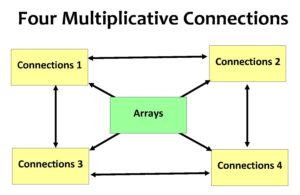Multiplicative Sampler
We have developed a comprehensive assessment tool in the form of a Multiplicative Thinking Quiz (MTQ). It is in four sections, each of which matches one set of multiplicative connections in our array-based Multiplicative Thinking Model. In this sampler, we provide a copy of the model, one of the MTQ test items, and a Key Task designed to remediate children’s understanding as identified by the test item. We strongly recommend that teachers engage with our professional learning to learn more about multiplicative thinking before embarking on a teaching program.
We developed this model for multiplicative thinking over four years. We believe that multiplicative thinking has four elements, each of which is based on the array. These elements are
Connections 1 – Equal groups, factors and multiples
Connections 2 – Times as many relationship
Connections 3 – Development of the multiplication algorithm
Connections 4 – Fraction, ratio, and proportional reasoning
To view the entire Mulitplicative Model document, click on the model image or here.
SAMPLE ASSESSMENT ITEM
This sample assessment item is based on Connections 1 and is designed to assess children’s capacity to generate an appropriate word story to match a given multiplication and division fact. It requires children to understand how the array shows a number of equal groups and that the first number in the number fact tells us the number of groups (rows in the array) and the second number tells how many are in each group (or how many in each row of the array). In our research we found that many children struggled to provide an appropriate story, possibly indicating that they had not had much experience of doing so.
SAMPLE KEY TEACHING TASK
This sample task is titled Tell Me A Story. Children are required to make an array and then write a story based on the ‘number of groups x the number in each group’ convention. Following that, they are asked to re-write their story as a division story. The task is structured the same as all of our teaching tasks. It contains links to key mathematics, links to the proficiencies, links to the assessment item with preferred responses, details of how to conduct the task, and notes for teachers.
